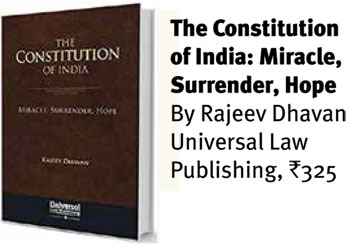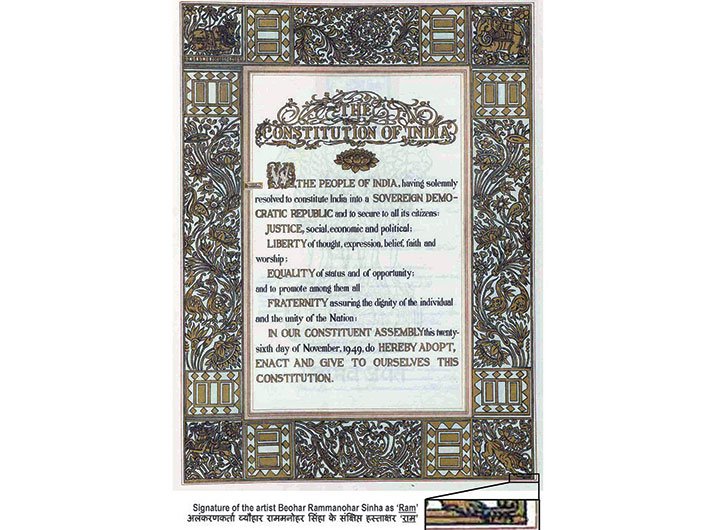
Through a curt two-paragraph letter on December 11, 2017, Rajeev Dhavan, senior advocate of the supreme court, informed chief justice of India (CJI) Dipak Misra about his decision to quit legal practice. This was in response to the “humiliating end to the Delhi case” where he was reprimanded by the CJI for speaking in ‘loud tone’. But on December 28, on the insistence of the clients he was representing in the apex court, he decided to change his decision and agreed to continue with his legal practice.
In a fresh letter to the CJI, he said while he believes that “there are some things fundamentally wrong with the court and its functioning”, he shall never abandon his “faith in the rule of law for which the entire judiciary including the legal community are custodians for the people”. He added, “I am saying no more than what I have articulated in my modest book – ‘The Indian Constitution: Miracle, Surrender, Hope’.”
The book he referred to talks about the miracle that the Indian constitution has proved itself to be; by ensuring its survival against several odds, the surrender that it warrants from people because of its ‘contractual nature’ and the hope its exudes in spite of its various failings and fault lines.
In the book, Dhavan writes that the reason for calling the constitution a miracle is a belief that “if we were called upon to create a new constitution afresh now, we would certainly fail”.
In a freewheeling chat, the legal luminary explains the reason for this assertion and also shares his views on various others issues related to law, constitution and judiciary.
“Constitution making is matter of compromise. It is a work of conciliation. It requires great amount of sobriety. The constituent assembly that drafted the original constitution had all of it. Today, if the constitution has to be drafted anew the politicians will fight over every comma. There is no constructive debate or deliberation taking place in parliament today. I have analysed myself that average daytime spent on a bill was 0.72 day in the Rajya Sabha and 0.65 in the Lok Sabha.”
He adds, “The decline of parliament is immense as people who go there now do not care about their constituencies. We don’t have sober process, sober people and sober sense of direction.”
“What is the point of making so much fuss about the Rafale deal? Is this revenge for Bofors,” he says, referring to the ruckus witnessed in parliament in February. He, however, makes a thoughtful addition immediately, “But, still I will say we are the greatest democracy.”
Given the state of affairs he talks about, where does this hope, this belief in ‘India being the greatest democracy’ emanate from?
He reiterates his views presented in the book. “Pakistan’s constitutional assembly took seven years to produce the constitution of the Islamic republic in 1956. Two years later, it was taken over by dictators. This happened frequently. Pakistani judges had to use what I call ‘juristic witchcraft’ to justify each change. The constitution of Ceylon [now Sri Lanka] of 1948 had to be rewritten and redone. Burma’s constitution of 1948 collapsed; its governance taken over by generals. Bangladesh’s constitution could not avoid turmoil and went the Pakistan way. Even little Nepal struggled to reconcile differences. India’s constitution survived the scare of the Emergency and has continued, its script rewritten with 100 amendments and its meaning transformed by its judiciary,” writes Dhavan.
In the book he calls for the abolition of the provision which allows the imposition of the president’s rule on states. According to Dhavan, the use of this provision to dismiss a democratically elected government, while subject to judicial review, should be done away in entirety to protect federalism, which forms one of the most important strands of the basic structure of the constitution.
Writing a review of ‘The Oxford Handbook of the Indian Constitution’ in The Indian Express in 2016, Dhavan had remarked, “The constitution is the site of struggle – to preserve it, make something of it and allow those engaged in a struggle for dignity and opportunity to use it.” Asked to elaborate, Dhavan says, “There is immense abuse of power in recent times. Arrogance is increasing drastically. People need to fight it at different forums and wage various struggles. The site of struggle is with people and it is with each and every democratic institution.”
Indeed, among other institutions, the supreme court on many occasions helped people in their fight to live with dignity. The higher judiciary has repeatedly risen to the occasion to safeguard the constitutional edifice and democratic ethos of the country, earning the trust of the people. However, corruption in the higher judiciary has significantly eroded this trust. How do we check this trend?
“We have no mechanism to examine corruption in the judiciary. In the lower judiciary, it is done by the high courts. High courts have failed to root out corruption in the lower judiciary. Then, there is hidden corruption in the supreme court. We have the system of impeachment. But that has not been effective. An in-house system was worked out in 1992. Here we saw that transfer [of the judge in question] to the high court of another state was the most frequently used option. Most of the erring judges were transferred to Sikkim. The people of Sikkim must also be thinking why are they getting only such judges,” says Dhavan.
“Chief justice Dipak Misra has taken in-house proceedings forward. In the recent case of the allegations against the judge of the Allahabad high court, he appointed a panel of judges, sought a report. But then this makes nonsense of the impeachment proceedings. It is becoming a method of pre-empting impeachment.”
Asked if power of contempt dissuades whistle-blowers in highlighting the case of alleged corruption in judiciary, Dhavan says, “There is no doubt that power of contempt is huge and it certainly dissuades people from talking about corruption in judiciary.”
On January 12, in an unprecedented move, four senior judges of the supreme court publicly alleged irregularities within the apex court and questioned CJI Dipak Misra’s assignment of cases. Commenting upon the incident Dhavan says, “The functioning of the supreme court depends upon the captainship of the CJI. If that captainship fails there surely shall be a problem. If important matters are sent to certain benches or allocations are faulty than the edifice collapse.”
Asked if he feels the issue flagged by the four judges has been addressed, Dhavan says, “I am not very sure.”
Separation of power is indispensable to the smooth functioning of democracy and in this context ‘judicial overreach’ has become a buzzword in recent decades, with the higher judiciary intervening in matters that exclusively lies in the domain of the legislature and the executive.
“There is an overreach but I think it is hardly in matter of general governance. It is more in matters like environment and forests. The problem is that idiosyncrasies in the supreme court are too much. Markandey Katju, former supreme court judge, wanted the government to find out by scientific research, inexpensive methods of converting salt water into fresh water. This was his idea of resolving the shortage of drinking water and ultimately, the Cauvery dispute.”
Dhavan feels that the preamble of the constitution is not entirely true in spirit, and he proposes his own “cheeky” version: “We the People of India, who had little say in the making of the constitution but were represented by people selected without mandate, have been informed to accept this constitution, lest there be chaos.
“We realise that our constitution, part of which is British India clone, makes unreal promises about justice, liberty, equality, fraternity, sovereignty, socialism, secularism and democratic republicanism. We have no choice but to accept this arrangement …but we promise we will overcome every attempt to oppress us by and through this giant which our leaders have given to themselves to rule over us.”
The book, while extoling the resilience of Indian constitution, also amply criticises it for its failings in ensuring distributive justice. “How long shall we continue to deny equality in our social and economic life? We must remove this contradiction at the earliest possible moment or else those who suffer from inequality will blow up the structure of political democracy which this assembly has so laboriously built up,” writes Dhavan.
This persistent juxtaposition of successes and failures makes ‘The Indian Constitution: Miracle, Surrender, Hope’ a thought-provoking read. The book by all means is an oxymoronic interpretation of the Indian constitution, where ‘hopeful- despair’ and ‘despairing -hope’ underline the present, past and future of Indian constitution and democracy, leaving the reader with many questions than answers.
feedback@governancenow.com
(The book review appears in the March 15, 2018 issue)

